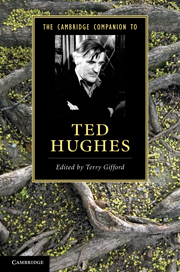Book contents
- Frontmatter
- Contents
- Acknowledgements
- Contributors
- Note on Referencing and Abbreviations
- Chronology
- Introduction
- 1 The problem of biography
- 2 The debates about Hughes
- 3 Hughes and animals
- 4 Ted Hughes and Sylvia Plath
- 5 The anthropologist’s uses of myth
- 6 Hughes’s social ecology
- 7 Hughes and feminism
- 8 Hughes and the classics
- 9 Hughes as prose writer
- 10 Hughes on Shakespeare
- 11 Class, war and the Laureateship
- 12 Hughes and his critics
- Guide to further reading
- Index
12 - Hughes and his critics
Published online by Cambridge University Press: 28 July 2011
- Frontmatter
- Contents
- Acknowledgements
- Contributors
- Note on Referencing and Abbreviations
- Chronology
- Introduction
- 1 The problem of biography
- 2 The debates about Hughes
- 3 Hughes and animals
- 4 Ted Hughes and Sylvia Plath
- 5 The anthropologist’s uses of myth
- 6 Hughes’s social ecology
- 7 Hughes and feminism
- 8 Hughes and the classics
- 9 Hughes as prose writer
- 10 Hughes on Shakespeare
- 11 Class, war and the Laureateship
- 12 Hughes and his critics
- Guide to further reading
- Index
Summary
The critical reception of Hughes’s work has often generated impassioned pronouncements, on occasion courting hyperbole. Writing in a 1975 postscript to a reprint of Articulate Energy, Donald Davie expressed exasperation at what he took to be Hughes’s rejection of ‘the terms of the contract [between the poet and his readers] accepted by the Movement poets’ in the 1950s. In its place, he averred, Hughes ‘accepted instead, as he may have learnt afterwards with dismay, the terms of that grosser contract which put him on a par with Mick Jagger’. In other words, Hughes, in line with his North American contemporary Allen Ginsberg, had capitulated to the zeitgeist and its witless revolt, in Davie’s jaundiced opinion, ‘against civilization’. By way of contrast, in the same year in which Davie’s postscript appeared, Seamus Heaney gave a lecture at Berkeley, documenting how Hughes ‘recalled English poetry in the fifties from a too suburban aversion of the attention from the elemental’, in the course of which Hughes is likened by Heaney not to the Stones’ front-man, Jagger, but Shakespeare’s ‘Poor Tom on the heath, a civilized man tasting and testing the primitive facts’. Linking Davie’s and Heaney’s disparate evaluations is the contentious issue of Hughes’s ‘primitivism’, his belief in that which Harold Bloom identifies as a recurrent preoccupation of those he somewhat reductively dubs the ‘last romantics’ (whose number include, beside Hughes, W. B. Yeats, D. H. Lawrence and Robert Graves): the desirability of ‘a preternatural catharsis to heal a magical spirit in us’. This is, of course, the theme of many of Hughes’s critical writings, culminating in his extraordinary analysis of Shakespeare’s ‘Tragic Equation’ (SGCB 1 and passim) and his late reflections on the shamanic dimensions to T. S. Eliot’s poetry in A Dancer to God. Hughes’s critical reception is understandably dominated by a comparable concern with the poetry’s recurrent exploration of the chthonic spirit which, in Shakespeare and the Goddess of Complete Being, Hughes describes as a potentially ‘renovating spirit’– that force animating ‘poor’ or ‘Mad Tom’ in King Lear, and which crucially facilitates the king’s ‘rebirth’ amid the tempestuous elements on the heath (SGCB 275).
- Type
- Chapter
- Information
- The Cambridge Companion to Ted Hughes , pp. 162 - 174Publisher: Cambridge University PressPrint publication year: 2011

